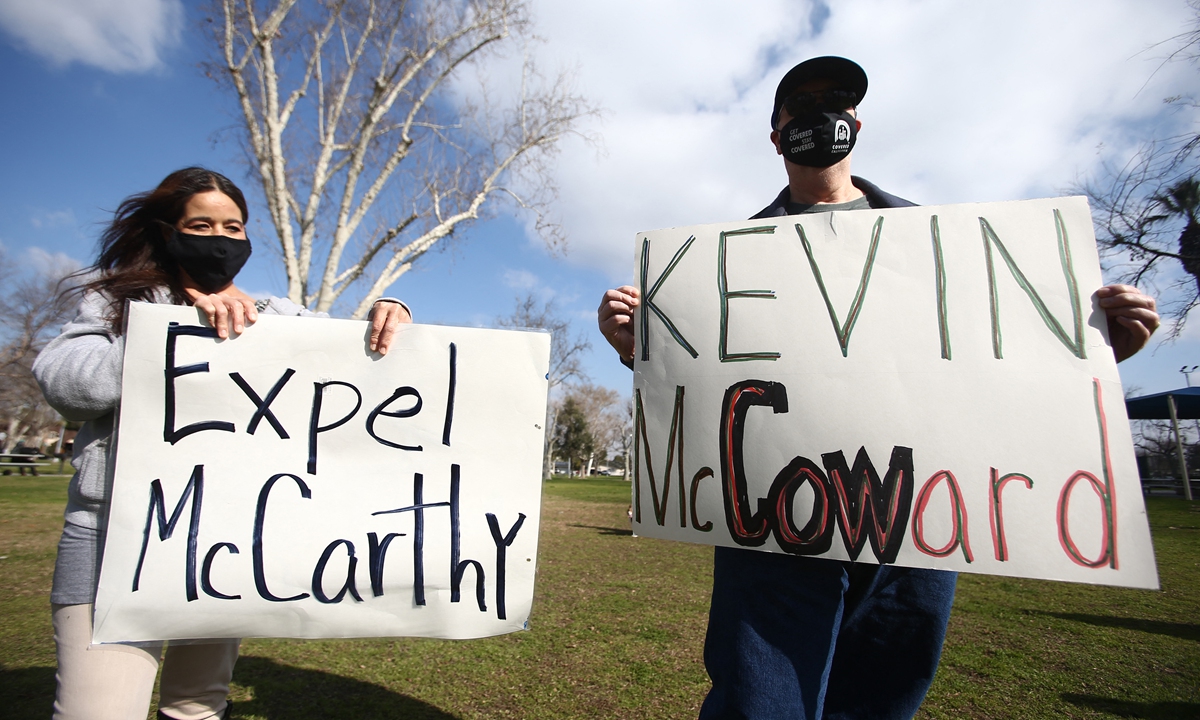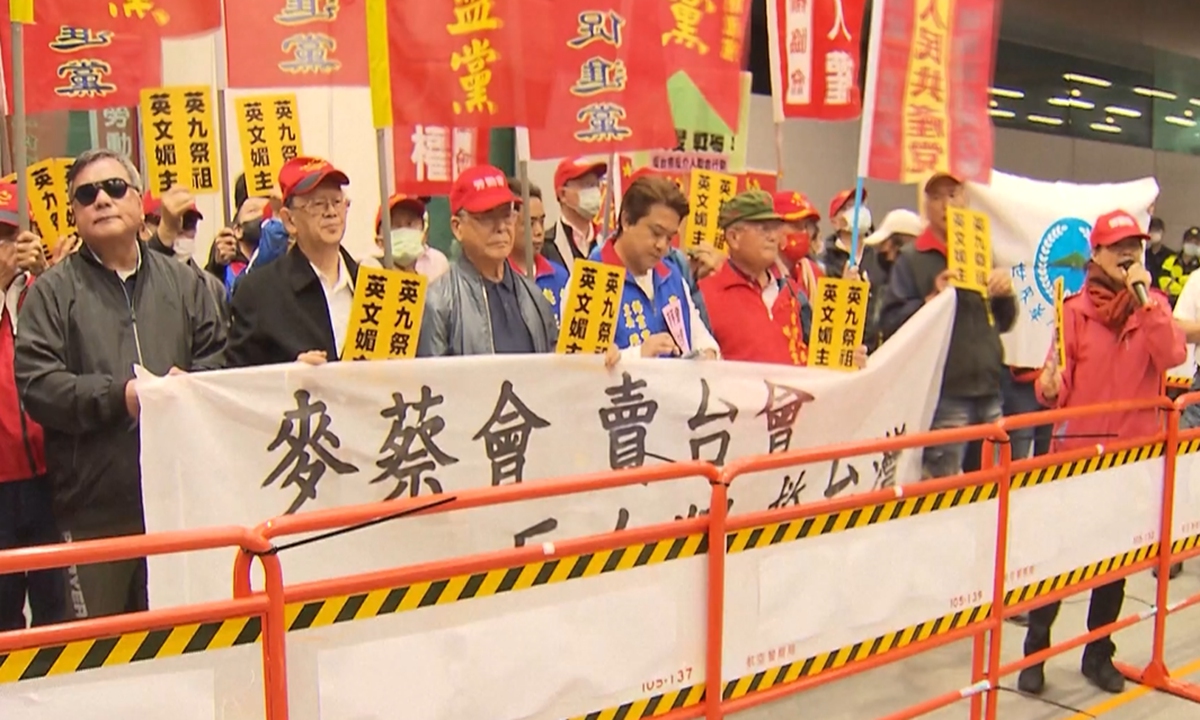
Demonstrators protest against Kevin McCarthy's push of his political ally Marjorie Taylor Greene, a far-right, controversial politician, to the House Committee on Education and Labor at McCarthy's Bakersfield office on February 04, 2021, in California, the US. Photo: AFP
Wednesday's meeting between US House Speaker Kevin McCarthy and Taiwan regional leader Tsai Ing-wen, who visited the US under the guise of "transit," has sparked outrage over blatantly trampling on China's bottom line.
Known as an "anti-China spearhead," this third-most powerful official in the US has worsened the already damaged China-US relations, and the ridiculous political show he staged with Tsai embarrassed the Biden administration, which has recently released frequent signals about seeking to maintain communication with Beijing.
As someone who was only elected as speaker after 15 rounds of voting, McCarthy is infamous for his opportunistic political tendency and mindless anti-China stance. He was an unpopular choice even within the Republican Party, and the extreme anti-China stance is one of the few cards he can play, observers said.
Holding an anti-China stance is one of the main tricks US politicians like McCarthy can use to gain support, they noted.
Weak positionIn January, McCarthy was finally elected as the new speaker after 15 rounds of voting - the longest time taken to elect a speaker since before the Civil War - despite his party having a majority in the chamber.
It's obvious that many people in the US were reluctant to see McCarthy become the No.3 person in the country next only to the president and vice president. Some Republicans are dissatisfied with his speculative attitude, believing he is "neither conservative enough nor tough enough," said the Associated Press (AP).
"He's morphed into as odious a creature as we've seen in American politics," read one opinion piece in the US media after McCarthy was elected. "He no longer deserves a position of public trust and should be held accountable for his unconscionable actions."
McCarthy's actions include providing access to sensitive surveillance footage from the US Capitol riot on January 6, 2021, to Fox News host Tucker Carlson, a "deeply partisan figure," according to AP. Earlier, to gain support, McCarthy offered "a slate of concessions" to those blocking his bid for the speakership, including making it easier to oust the speaker, reported ABC News.

Residents in the island of Taiwan protest against regional leader Tsai Ing-wen's US "transit" at the Taiwan Taoyuan International Airport on April 7, 2023. Photo: VCG
Play 'China' cardsAttacking China has also become a regular ploy. Ahead of the midterm elections last year, McCarthy said House Republicans would create a select committee on China once they take control of the chamber.
Three days after assuming office as speaker of the House, he immediately set up the committee to address the so-called multifaceted threats from China to the US.
Earlier in May 2020, as then-House Minority Leader, McCarthy announced the launch of a "China Task Force" to coordinate legislative strategy "on all aspects of the China challenge." By hyping the "China threat" cliché, the agency McCarthy pushed to be established aimed to further decouple the US from China in various ways including attempting to replace China in the global supply chain.
He also made many provocative remarks against China and played the "Taiwan card." Last month, despite the statement from White House national security spokesperson John Kirby that the US "respected the one-China policy" and did not want to see a change to the "status quo" of the Taiwan Straits, McCarthy confirmed that he planned to meet with Tsai in the US.
McCarthy's hardline stance against what he calls "Communist China" echoes the infamous Joseph McCarthy, who pushed the Red Scare of "McCarthyism" about 70 years ago.
Joseph McCarthy represents a segment of Washington's ugly history, a sinister wind of the Cold War, which Kevin McCarthy inherited in this century, Chinese analysts pointed out.
Not only do the two share the same surname, but they are also very similar in terms of their style of discourse, political posturing, anti-communist logic, and ideological stripes. Many worry that such a reincarnation would reverse the course of history and shackle the US even further.
Kevin McCarthy is politically weak in both the US House and the Republican Party. Therefore, he hopes to use "anti-China" rhetoric and the "Taiwan question" to gain more support and create the illusion that he is an influential figure in local politics, Lü Xiang, research fellow at the Chinese Academy of Social Sciences, told the Global Times on Thursday.
As the US 2024 general election approaches, the Republican Party will further use Taiwan as a tool to exert its influence, said Lü.
Some political observers see McCarthy's current acts that touch China's bottom line as a backlash against Washington's recent frequent signals to Beijing that it wants to maintain bilateral communication, creating a dilemma for the Biden administration and slapping Washington harshly in the face.
Charles W. Freeman Jr., a former senior US diplomat, told the Global Times in a previous interview that there has been a lot of slippage over the three China-US joint communiqués by the US side over the past 40 years.
"I remember very well what the terms of normalization were. No official relationship, no defense commitment, and no troops or facilities on the island. All of these have just been to some extent violated. That is a problem. There are delicate issues as well on the Chinese side. We're in a very difficult situation, which calls for statecraft and wisdom on both sides. And I don't see that happening soon," he said.
Freeman pointed out that the situation now is that American politicians of one sort or another like to go to the island of Taiwan and shake their fists at China. "Then China reacts, and then they feel well, we got China's attention, so this is good," he said.
"Now there are a lot of people in Taiwan who don't like being made into a platform from which American officials or legislators can exploit anti-China sentiment in the US," Freeman noted. "This isn't good for Taiwan. It isn't good for the mainland."
Way to build consensus
The US House voted overwhelmingly by 365 to 65 to create a new select committee on strategic competition between the US and China, with encouragement from McCarthy, Reuters reported on January 12. Hyping up anti-China issues seem to have become a way to build consensus between the quarrelsome two parties in the US, observers told the Global Times.
The US has previously launched bipartisan acts against China, such as a law that prevented Chinese people from emigrating to the US at the turn of the 20th century.
The Chinese Exclusion Act of 1882 which banned further immigration of Chinese workers and barred existing residents from naturalization and voting lasted for roughly six decades, and marked the first and only time the US federal government explicitly rejected a group of immigrants on no basis other than their nationality.
The list also extends to the America COMPETES Act of 2022, which encouraged the relocation of manufacturing of critical goods back to the US. It also called for strengthened ties with Taiwan island and provocation of China on affairs involving Xinjiang, Xizang, and Hong Kong.
In June 2021, the US Senate approved the US Innovation and Competition Act, which smears China's development path and domestic and foreign policies, and hypes the "China threat theory." Experts believe it is an indication that the US has gone deeper into its China containment obsession.
However, the House's version of the act cut more than half of the $190 billion in funding to be used to strengthen US scientific research and technological innovation.
The US is unwilling to provide enough subsidies for its own key industries, but it still wants to make great efforts to sabotage China, experts noted.
The rare "mutual support" between the two parties in the US is also frequently reflected in bills related to the Taiwan question. The 2022 annual US National Defense Authorization Act (NDAA) contains content related to Taiwan island. For example, the legislation authorized up to $10 billion in security assistance over the next five years to modernize Taiwan's security capabilities to deter aggression by Beijing.
Chinese experts said this shows that the two parties in the US are keeping on the same page in taking advantage of the Taiwan question to serve their political purposes.
What is behind this consensus is that the US is facing political and economic instability, so politicians hope to use anti-China sentiment to rally public opinion and deflect attention from domestic issues, according to Lü.
A bipartisan consensus or consistency in confronting China will trigger strategic instability in the world and hinder global development, Lü said.
"However, while McCarthy can cause trouble, he is unlikely to shake the bottom line on the Taiwan question. McCarthy's misconduct is a political provocation, but can't really overthrow China-US relations," said the expert.





